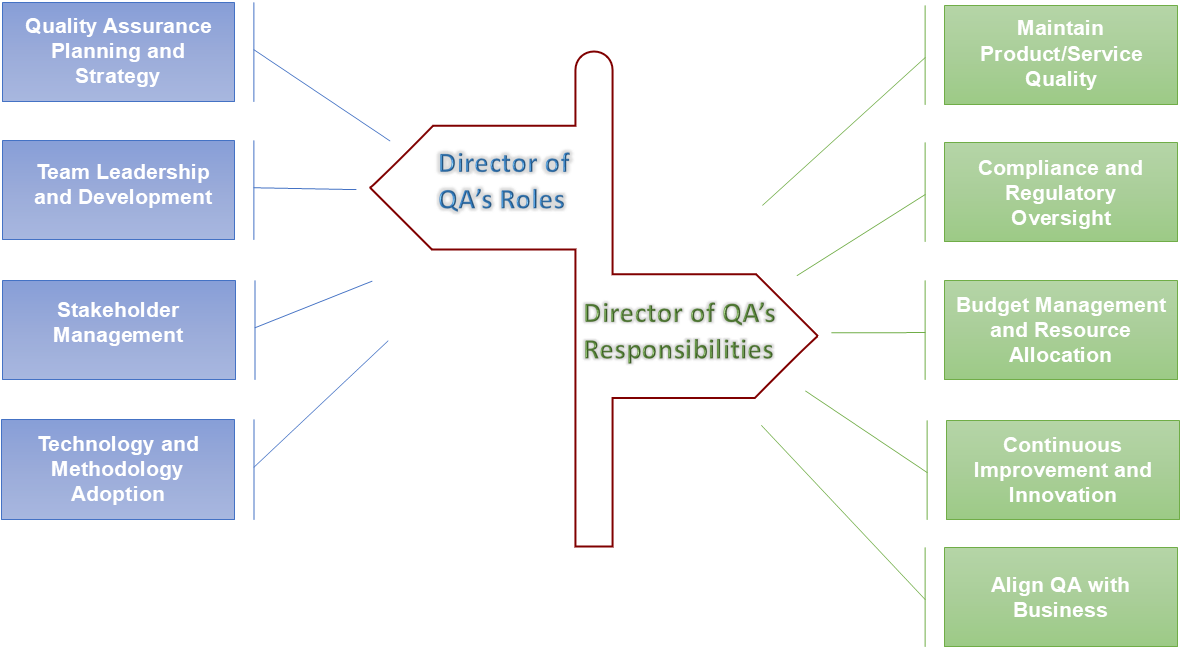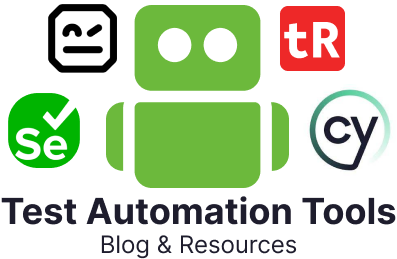The role of a Director of Quality Assurance (QA) is multifaceted. It requires an amalgamation of technical, business and social skills.
This article tries to shed light on the traits, designations, roles and responsibilities of a Director of QA. Understanding these elements will help you to uphold high-quality standards within your organization.
What are the Traits of a Director of QA?
The traits and mindsets essential for success in the Director of QA role are:
Analytical Mindset
An analytical mindset distinguishes a successful Director of Quality Assurance (QA). This trait is fundamental as it will help you to break down complicated problems into manageable parts to identify root causes and devise effective solutions.
Example: A Director of QA with an analytical mindset would analyze historical data to identify patterns that might suggest a deeper systemic issue when faced with a recurring issue in the QA process. They might use statistical tools to analyze defect frequencies, categorize issues based on severity and prioritize them for resolution based on their impact on the user experience and business objectives.
Leadership and Communication Skills
Consider leadership and communication as indispensable traits for being a Director of QA. You must inspire and guide your teams towards a shared vision of quality to foster a culture where quality is everyone’s responsibility. Practical communication skills will help you articulate quality standards, expectations and feedback clearly and constructively.
Example: A successful Director of QA can lead cross-functional meetings to discuss and align on quality objectives through jargon-free language that resonates with stakeholders from various departments. They also need to be adept at listening which will allow them to understand team concerns, customer feedback and stakeholder expectations. This will facilitate more informed decision-making.
Adaptability and Continuous Learning
The technology and quality assurance landscapes are constantly evolving. Therefore, adaptability and a commitment to continuous learning are vital traits for a Director of QA. You must stay abreast of the latest QA methodologies, tools and technologies to maintain and enhance product quality.
Example: A Director of QA who actively seeks out and implements agile QA processes in response to the organization’s shift towards agile development methodologies. By embracing change and encouraging their teams to learn and apply new skills, they ensure that the QA function remains responsive and relevant.
Strategic Thinking
Strategic thinking will allow you to develop long-term quality assurance strategies that align with the broader organizational goals. This involves focusing on immediate quality issues and anticipating future challenges and opportunities. A Director of QA demonstrating strategic thinking might conduct a SWOT analysis (Strengths, Weaknesses, Opportunities, Threats) to evaluate the QA department’s current state. Based on that, they can dentify strategic initiatives that leverage strengths, address weaknesses, exploit opportunities and mitigate threats.
Example: They might recognize the opportunity to improve product quality and reduce time-to-market by integrating automated testing tools into the QA process. This initiative aligns with the organization’s goal of accelerating digital transformation.
Designations and Career Path
Becoming a Director of Quality Assurance (QA) is marked by a progression through various roles and responsibilities within the quality assurance field. Understanding the typical career path and the designations that lead to a Director of QA position will give you valuable insights for preparing for this position.
QA Hierarchies
The QA hierarchy within an organization typically starts with entry-level positions and progresses to more senior, strategic roles. At the entry level are QA Analysts or QA Testers. They are primarily responsible for executing test cases, identifying bugs and documenting their findings.
With experience, they may advance to Senior QA Analysts. This role requires them to take on more complex testing scenarios and specialize in areas like automation or performance testing.
The next step in this career ladder often involves moving into a QA Lead or QA Manager role. Individuals in these positions oversee QA teams on specific projects or across the department. They are tasked with planning testing strategies, managing resources and ensuring that quality objectives are met on time and within budget.
Finally, the QA Directors or Directors of QA oversee the entire quality assurance department. This position involves strategic planning, developing and implementing QA processes and standards, managing budgets and liaising with other departments to ensure product quality aligns with business goals. It’s a role that requires a broad understanding of both the technical aspects of QA and the business implications of quality.
| Designation | General Resposibilities |
|---|---|
| QA Analyst / QA Tester |
|
| Senior QA Analyst |
|
| QA Lead |
|
| QA Manager |
|
| Director of QA |
|
Educational and Professional Requirements
While the path to becoming a Director of QA varies, most candidates possess a bachelor’s degree in Computer Science, Information Systems, or a related field. Advanced degrees, such as a master’s in business administration (MBA) with a technology focus can be advantageous for understanding the business aspects of the role.
Professional certifications will also play a crucial role in career advancement. Certifications like the ISTQB (International Software Testing Qualifications Board) Advanced Level, CSTE (Certified Software Test Engineer), or CMST (Certified Manager of Software Testing) demonstrate a commitment to the profession and a mastery of best practices in QA.
Roles of a Director of QA
Here are the roles that a Director of QA should carry out in their job:
Quality Assurance Planning and Strategy
You need to excel in planning and strategizing quality assurance activities. This involves developing a comprehensive QA strategy that aligns with the organization’s objectives to ensure products meet the highest quality standards before reaching the customer.
For instance, a Director of QA at a software company might implement a shift-left testing approach which integrates testing earlier in the development lifecycle to identify and fix defects more efficiently. This strategic decision improves product quality and reduces the time and resources spent on fixing issues later in the development process.
Team Leadership and Development
A critical role of the Director of QA is leading and developing their team. This includes hiring skilled QA professionals, providing ongoing training and fostering a culture of continuous improvement.
An example of effective team leadership could involve the Director of QA launching a mentorship program within the QA department to pair less experienced testers with seasoned professionals. This initiative helps in skill transfer, boosts team morale and increases productivity. This kind of pairing also ensures that all team members are well-versed in the latest QA techniques and tools.
Stakeholder Management
You must effectively manage relationships with stakeholders across the organization. This includes working closely with product development teams to integrate quality considerations, negotiating quality objectives with senior management and communicating quality achievements and challenges to the board.
For example, a Director of QA might facilitate a monthly stakeholder meeting to present key quality metrics such as defect rates and testing coverage. This demonstrates the progress toward quality objectives and gives scope to discuss improvement areas.
Technology and Methodology Adoption
You need to keep yourself updated on the latest trends and technologies in the domain of quality assurance. You are responsible for identifying, evaluating and integrating new QA technologies and methodologies that can enhance the effectiveness and efficiency of the QA processes.
Suppose a new automated testing tool emerges that significantly reduces the time required to run regression tests. The Director of QA evaluates this tool’s compatibility with existing systems, considers the cost against the projected ROI and decides to implement it. This decision speeds up the testing process and frees QA team members to focus on more complex testing tasks. Thus, the overall productivity and product quality is improved.
Responsibilities of a Director of QA
As a Director of Quality Assurance (QA), you need to ensure the highest quality standards for products and services within an organization. This position entails various responsibilities, from strategic planning to operational oversight. Each of these is crucial for maintaining and enhancing the quality assurance framework. Below are details of these responsibilities to help you better understand the role.
Maintain Product/Service Quality
A primary responsibility is to guarantee that all products or services meet and exceed customer expectations and regulatory standards. This involves setting quality standards, developing quality control processes and implementing quality improvement programs.
For instance, in a pharmaceutical company, the Director of QA would oversee the implementation of rigorous testing procedures for new drugs to ensure they meet health authorities’ safety and efficacy standards. This would include everything from initial laboratory testing to the management of clinical trials and the final approval process.
Compliance and Regulatory Oversight
You are responsible for ensuring that the organization complies with industry standards and regulatory requirements. This includes staying updated on relevant laws and regulations, conducting regular compliance audits and leading corrective actions when compliance issues are identified.
For example, in the automotive industry, the Director of QA would ensure that all vehicles meet environmental and safety standards. They would do this by coordinating with engineering and manufacturing teams to implement compliance measures and conduct regular inspections and audits.
Budget Management and Resource Allocation
You should know effective budget management and resource allocation as they are critical responsibilities for this role. You must ensure that the QA department is adequately funded and that resources are allocated efficiently to meet quality objectives. This could involve negotiating with senior management for budget increases to adopt new testing technologies or reallocating resources from less critical to more critical areas based on risk assessments.
For instance, if a software development company is releasing a new product, the Director of QA might allocate more resources to automate testing for this project to ensure a smooth and successful launch.
Work Towards Continuous Improvement and Innovation
As a Director of QA, you drive continuous improvement and build a culture of innovation within the QA department. This involves identifying opportunities for process improvements, encouraging innovative thinking among team members and implementing new technologies or methodologies that enhance the efficiency and effectiveness of QA processes.
An example of this could be the introduction of machine learning algorithms to predict potential defects in manufacturing processes. This would allow preemptive quality control measures and reduce the rate of defective products.
Align QA with Business
It is very easy for teams to work in silos without thinking of the bigger picture. One of your primary responsibilities is to ensure that the QA processes and standards align with what the business needs to achieve. If the business requires quick deliveries of certain features then you need to figure out how to implement quality control within those timelines. Or if there are certain compliance requirements essential to business then those need to be baked into your QA checks.

Conclusion
The Director of QA plays a crucial role in embedding quality into an organization’s DNA. They are the guardian angels of QA who ensure that products and services meet and exceed the expectations of customers and regulatory bodies. You need to build your strategic foresight, leadership skills and a deep understanding of quality assurance practices to take on the challenges associated with this role.

